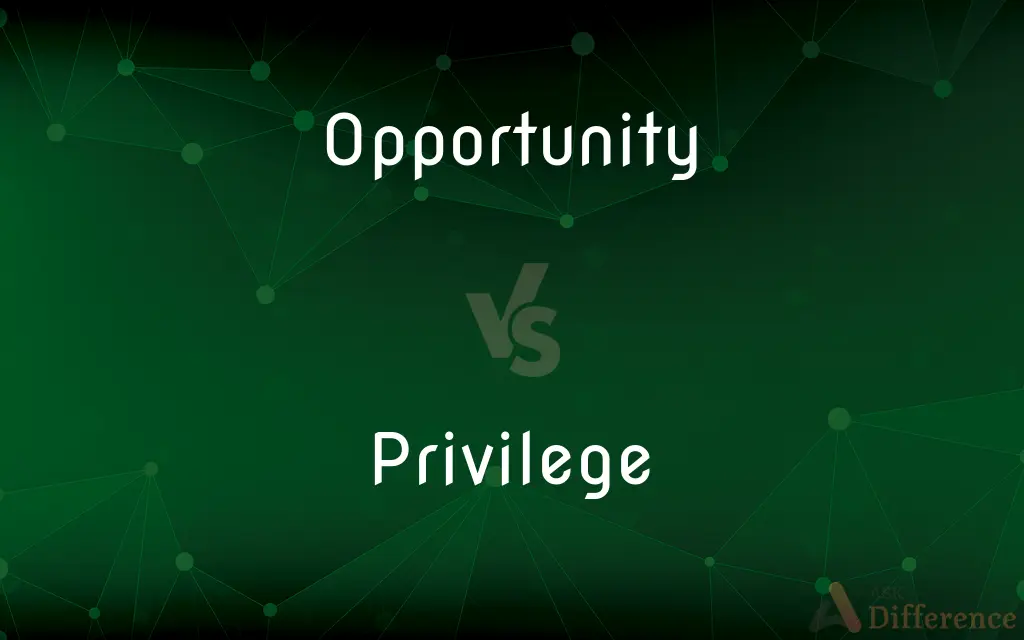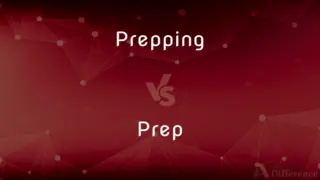Opportunity vs. Privilege — What's the Difference?
Edited by Tayyaba Rehman — By Urooj Arif — Updated on April 2, 2024
Opportunity signifies a chance for advancement or success available to anyone, while privilege refers to a special right or advantage available only to a specific group or individual.

Difference Between Opportunity and Privilege
Table of Contents
ADVERTISEMENT
Key Differences
Opportunity is often seen as a set of circumstances that makes it possible to do something. It's generally accessible to anyone under the right conditions, focusing on the potential for positive outcomes. On the other hand, privilege is a benefit or advantage granted to individuals or groups based on certain attributes, often unearned and exclusive, highlighting societal disparities.
Opportunities are typically created or identified through situations, efforts, or initiatives that aim to enhance fairness and accessibility. They are pivotal in personal and professional development, fostering growth and success. Whereas privilege, by its nature, underscores inequality, as it's an advantage that's not universally accessible, often leading to unbalanced opportunities and outcomes.
While opportunities can be seized or missed by individuals, depending on their circumstances, choices, or efforts, privileges are inherently possessed or granted, independent of an individual's actions or merits. This distinction underscores the role of personal agency in taking advantage of opportunities, contrasted with the systemic or societal origins of privilege.
Opportunities are frequently associated with meritocracy, where effort and ability are believed to lead to success. They are seen as fair and motivating, encouraging individuals to strive for improvement and achievement. Conversely, privileges often perpetuate existing social hierarchies, benefiting certain groups over others without merit, which can demotivate and disenfranchise those without such advantages.
Opportunity and privilege both play significant roles in shaping individuals' lives, but their impacts and implications differ greatly. Opportunities are generally viewed positively, as they promote potential and hope for everyone, while privileges are more critically analyzed for perpetuating inequalities and favoritism in society.
ADVERTISEMENT
Comparison Chart
Definition
A chance for progress or success open to anyone under the right conditions.
A special right or advantage given only to a certain person or group.
Accessibility
Available to many or all, depending on circumstances.
Restricted to specific individuals or groups, often based on inherent or societal factors.
Basis of Availability
Merit, effort, or situational factors.
Inherent qualities, social structures, or unearned status.
Role of Personal Agency
High, as individuals must take action to capitalize on opportunities.
Low, as privileges are often granted without personal effort or merit.
Societal Implications
Encourages growth, development, and equality.
Highlights and often perpetuates social inequalities.
Compare with Definitions
Opportunity
A good position, chance, or prospect for advancement or success.
He saw the crisis as an opportunity to prove his leadership skills.
Privilege
An unearned benefit enjoyed by a certain group.
His background gave him privileges not available to everyone.
Opportunity
A favorable juncture of circumstances.
The job fair presented an opportunity for networking.
Privilege
A particular benefit or favor granted under certain conditions.
Parking spaces near the entrance are a privilege for employees of the month.
Opportunity
The possibility due to a favorable combination of circumstances.
The economic upturn offered businesses a new opportunity for growth.
Privilege
The advantage that wealthy and powerful people have over others.
She spoke out against the privileges that shielded corporate executives from accountability.
Opportunity
A situation or condition favorable for attainment of a goal.
Winning the scholarship was the opportunity of a lifetime.
Privilege
A special right, advantage, or immunity granted to a particular person or group.
Diplomatic immunity is a privilege of ambassadors.
Opportunity
A chance for employment or promotion.
She applied for the job, seeing it as an opportunity to advance her career.
Privilege
A right or immunity granted as a peculiar benefit, advantage, or favor.
Access to the executive lounge is a privilege of membership.
Opportunity
A time or set of circumstances that makes it possible to do something
The night drive gave us the opportunity of spotting rhinos
Increased opportunities for export
Privilege
Grant a privilege or privileges to
English inheritance law privileged the eldest son
Opportunity
A favorable or advantageous circumstance or combination of circumstances.
Privilege
A special right, advantage, or immunity granted or available only to a particular person or group
Education is a right, not a privilege
He has been accustomed all his life to wealth and privilege
Opportunity
A chance for progress or advancement, as in a career.
Privilege
A special advantage, immunity, permission, right, or benefit granted to or enjoyed by an individual, class, or caste.
Opportunity
A chance for advancement, progress or profit.
The world is full of opportunities and it's up to me to see them and pursue them.
Seize the opportunity
Take an opportunity
Missed opportunity
The opportunity came and went
You'll get a second opportunity if you miss this one.
Privilege
Such an advantage, immunity, or right held as a prerogative of status or rank, and exercised to the exclusion or detriment of others.
Opportunity
A favorable circumstance or occasion.
Having a holiday is a great opportunity to relax.
Privilege
The principle of granting and maintaining a special right or immunity
A society based on privilege.
Opportunity
Opportuneness
The Court questioned the opportunity of introducing these measures in such an uncertain economic climate.
Privilege
Protection from being forced to disclose confidential communications in certain relationships, as between attorney and client, physician and patient, or priest and confessor.
Opportunity
Fit or convenient time or situation; a time or place permitting or favorable for the execution of a purpose; a suitable combination of conditions; suitable occasion; chance.
A wise man will make more opportunities than he finds.
Privilege
Protection from being sued for libel or slander for making otherwise actionable statements in a context or forum where open and candid expression is deemed desirable for reasons of public policy.
Opportunity
Convenience of situation; fitness.
Hull, a town of great strength and opportunity, both to sea and land affairs.
Privilege
An option to buy or sell a stock, including put, call, spread, and straddle.
Opportunity
Importunity; earnestness.
Privilege
To grant a privilege to.
Opportunity
A possibility due to a favorable combination of circumstances;
The holiday gave us the opportunity to visit Washington
Now is your chance
Privilege
To free or exempt.
Privilege
To assign greater importance or priority to
“A Harvard Law grad who taught constitutional law at the University of Chicago, he is steeped in a tradition that privileges the Bill of Rights over the crude or arbitrary exercise of power” (Evan Thomas).
Privilege
An exemption from certain laws granted by the Pope.
Privilege
(countable) A particular benefit, advantage, or favor; a right or immunity enjoyed by some but not others; a prerogative, preferential treatment.
All first-year professors here must teach four courses a term, yet you're only teaching one! What entitled you to such a privilege?
Privilege
An especially rare or fortunate opportunity; the good fortune (to do something).
Privilege
(uncountable) The fact of being privileged; the status or existence of (now especially social or economic) benefit or advantage within a given society.
Privilege
A right or immunity enjoyed by a legislative body or its members.
Privilege
A stock market option.
Privilege
(legal) A common law doctrine that protects certain communications from being used as evidence in court.
Your honor, my client is not required to answer that; her response is protected by attorney-client privilege.
Privilege
(computing) An ability to perform an action on the system that can be selectively granted or denied to users.
Privilege
(archaic) To grant some particular right or exemption to; to invest with a peculiar right or immunity; to authorize
To privilege representatives from arrest
Privilege
(archaic) To bring or put into a condition of privilege or exemption from evil or danger; to exempt; to deliver.
Privilege
A peculiar benefit, advantage, or favor; a right or immunity not enjoyed by others or by all; special enjoyment of a good, or exemption from an evil or burden; a prerogative; advantage; franchise.
He pleads the legal privilege of a Roman.
The privilege birthright was a double portion.
A people inheriting privileges, franchises, and liberties.
Privilege
See Call, Put, Spread, etc.
Privilege
To grant some particular right or exemption to; to invest with a peculiar right or immunity; to authorize; as, to privilege representatives from arrest.
To privilege dishonor in thy name.
Privilege
To bring or put into a condition of privilege or exemption from evil or danger; to exempt; to deliver.
He took this place for sanctuary, And it shall privilege him from your hands.
Privilege
A special advantage or immunity or benefit not enjoyed by all
Privilege
A right reserved exclusively by a particular person or group (especially a hereditary or official right);
Suffrage was the prerogative of white adult males
Privilege
(law) the right to refuse to divulge information obtained in a confidential relationship
Privilege
Bestow a privilege upon
Common Curiosities
What is opportunity?
Opportunity is a set of circumstances that makes it possible to achieve something, available under the right conditions.
How do opportunity and privilege differ in accessibility?
Opportunities are more widely accessible, depending on circumstances, while privileges are exclusive to specific groups or individuals.
What is privilege?
Privilege is a special right or advantage granted to certain people or groups, often without merit.
Is privilege always negative?
While privilege itself is neutral, its effects can be negative if it perpetuates inequality and limits opportunities for others.
Can privilege be earned?
While some privileges can be attained through achievements, many are unearned and based on societal factors.
Can one’s background affect their access to opportunities?
Yes, an individual's background can significantly influence their access to opportunities, often related to education, socio-economic status, or social networks.
Can privilege affect one’s opportunity?
Yes, privilege can significantly impact one's access to opportunities, often making it easier for those with certain privileges to succeed.
How can society address the imbalance between opportunity and privilege?
Addressing systemic inequalities, promoting inclusivity, and creating equitable opportunities can help balance the scales.
Can opportunities lead to privileges?
Yes, seizing opportunities can sometimes lead to acquiring privileges, especially in terms of social or professional advancement.
How can individuals overcome barriers to opportunities?
Through education, networking, and advocating for equitable practices, individuals can overcome barriers to opportunities.
Are opportunities always fair?
Not always; while opportunities aim to be accessible, systemic inequalities can affect their distribution and accessibility.
How do opportunities contribute to personal growth?
Opportunities encourage individuals to develop skills, pursue goals, and achieve personal and professional growth.
What are the societal implications of privilege?
Privilege often highlights and perpetuates social inequalities, benefiting some at the expense of others.
What can be done to reduce the impact of privilege in society?
Promoting awareness, encouraging equality, and implementing policies that address systemic inequalities can reduce the impact of privilege.
What role does effort play in seizing opportunities?
Effort is crucial in taking advantage of opportunities, as it requires action and commitment to achieve desired outcomes.
Share Your Discovery

Previous Comparison
Crotch vs. Groin
Next Comparison
Prepping vs. PrepAuthor Spotlight
Written by
Urooj ArifUrooj is a skilled content writer at Ask Difference, known for her exceptional ability to simplify complex topics into engaging and informative content. With a passion for research and a flair for clear, concise writing, she consistently delivers articles that resonate with our diverse audience.
Edited by
Tayyaba RehmanTayyaba Rehman is a distinguished writer, currently serving as a primary contributor to askdifference.com. As a researcher in semantics and etymology, Tayyaba's passion for the complexity of languages and their distinctions has found a perfect home on the platform. Tayyaba delves into the intricacies of language, distinguishing between commonly confused words and phrases, thereby providing clarity for readers worldwide.














































